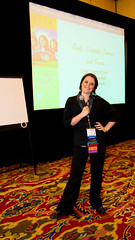I gave a lightning talk at MidWiC09 on how online communites are used at GHC. Below is my abstract and script.
In 2008, I decided to attend the Grace Hopper Celebration of Women in Computing (GHC). SInce I had not submitted a BOF, technical paper, or poster during the call for participation, I volunteered to contribute to the online community. THe GHC online community includes blogging, note taking via a wiki, tweeting on Twitter, sharing photos and videos via Flickr and YouTube respectively, and utilizing the social networks of Facebook and LinkedIn. This participation absolutely made my GHC experience, and I returned again in 2009 as one of the YouTube group coordinators. In this Lightning Talk, I will explain how the different online mediums are used and the benefits they provide beyond the conference.
LinkedIn and Facebook allow distribution of information over pre-established networks. More importantly it allows interaction between those in the networks that wouldn't happen if the info was solely sent in an email newsletter distributed via blind carbon copy.
Mediums used before the conference in addition to LinkedIn and Facebook were the GHC Blog, YouTube, and Twitter.
Before the conference, bloggers posted advice on how to make the most of the exhibits and recruiters, on what to pack, on networking. The blog allows for sharing of personal perspective, and bloggers shared why they feel GHC is so important, how GHC has affected their life, and what they hope to get out of the conference. Organizers also blogged to share some of the behind the scenes work done at the conference.
I was a coordinator of the YouTube group this year. I started a video blog with a classmate at GHC08 where we did two pre-conference videos introducing ourselves and going over what to pack. This year we did a five episode series that included introducing ourselves for anyone new to our show, providing tips to first time attendees, and going over the eight session tracks.
Twitter was used to distribute announcements of new blog posts or video or new information about the conference. It's also used as a networking tool. Many of the GHC09 official Twitterers did not know each other. At the conference, when we ran into one another (and realized it), we weren't meeting a stranger. I discoverer a Twitterer who works for Sun is from my home town after I tweeted about a Fort Wayne issue.
At the conference, all these mediums were used as was a Wiki for note-taking. While at the conference, a conflict arose, and I was unable to attend a session I felt would be beneficial to my career. However, I was able to access the Wiki at a later time to see notes not just from the presenter, but also the audience Q&A.
The blog was used to share personal reactions to sessions, as well as session summaries.
The YouTube group was used to video record attendees that may not be presenting as well as interview presenters.
Twitter was used extensively. The conference center actually had a Twitter account that followed those using the hashtag, and responded to requests for stronger WiFi, turning down A/C, and providing other venue-related q's. It also allowed people following the back channel at one session to tweet questions to people at other sessions to ask. For example, I was note-taking one session, and someone tweeted an interesting quote from another session. I replied with a question, which the woman was able to ask on my behalf.
Beyond the conference I use Twitter to keep in touch with the new members of my network. After seeing one woman invite my old roommate to a Girls Geek Dinner, I tweeted my jealousy. In response, the Su employee from my hometown declared we would have a geek dinner of our own over the winter holiday.
This post was originally published on Ashley's personal blog, Let's Eat that Big Fish, at http://organizefish.com/blog/archives/149.






